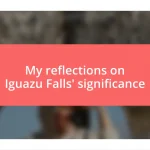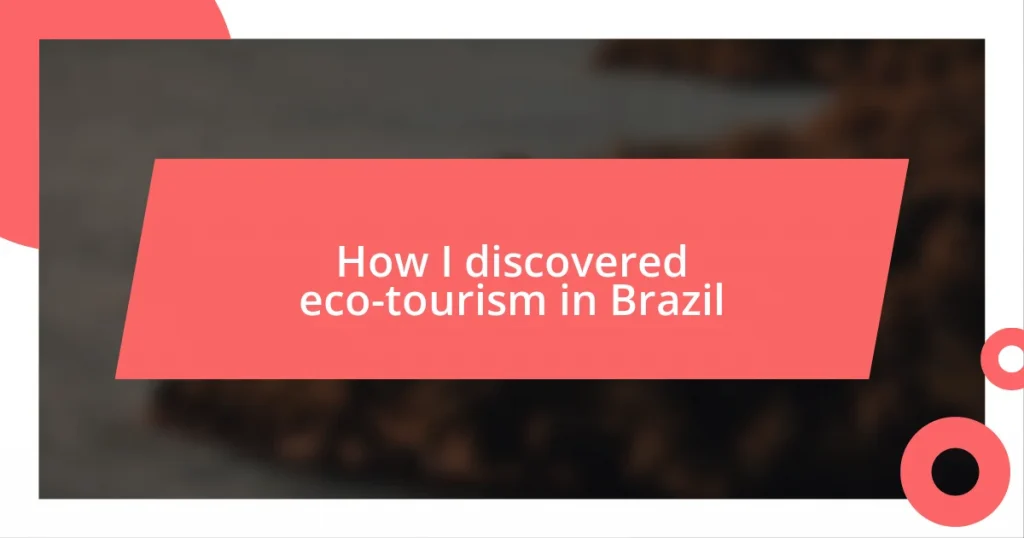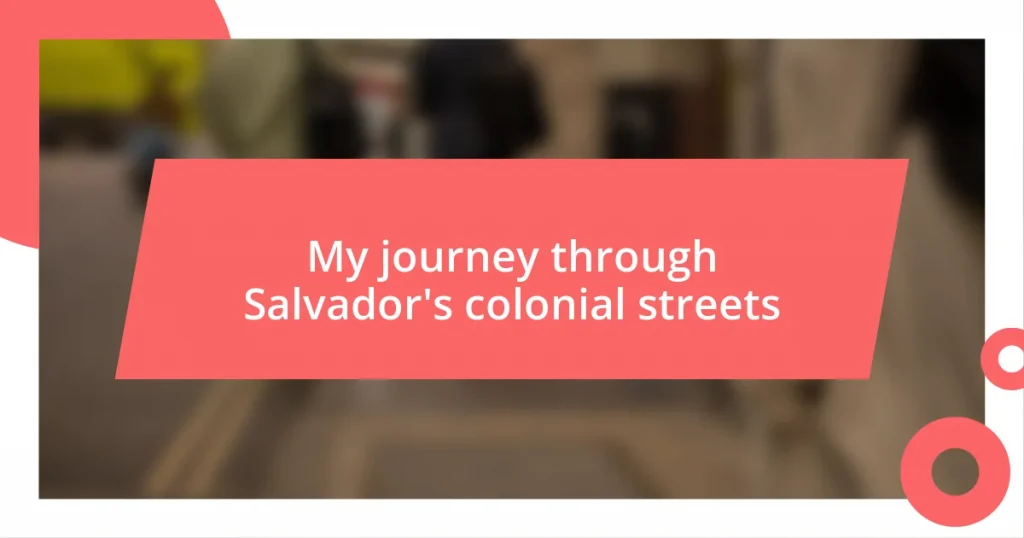Key takeaways:
- My journey in Brazil ignited a passion for eco-tourism through immersive experiences in diverse ecosystems, highlighting the interconnectedness of nature and culture.
- Engaging with local communities fostered meaningful connections and emphasized the importance of responsible tourism practices for preserving cultural heritage and the environment.
- Participating in conservation activities, such as tree planting and beach cleanups, reinforced the significance of individual choices in supporting sustainability and minimizing ecological footprints.

My Journey to Brazil
My first memory of Brazil was vividly colorful—a kaleidoscope of culture, sights, and sounds that seemed almost surreal. I remember stepping off the plane in Rio de Janeiro and being engulfed by the warm, salty air filled with the distant beats of samba. Can you imagine waking up to the sound of waves crashing against the shore while palm trees sway gently outside your window? It was pure bliss.
As I traveled deeper into Brazil, each destination felt like a new adventure, unveiling the breathtaking natural beauty the country is known for. In the Amazon rainforest, I found myself awestruck by the sheer biodiversity. There was a moment when I stood silently, listening to the symphony of nature—the rustle of leaves, the call of exotic birds, and the occasional roar of an unseen animal. Have you ever felt utterly small in the presence of such grandeur? That’s exactly how I felt, and it was humbling.
One evening, as the sun dipped below the horizon, painting the sky in shades of orange and purple, I joined a local guide who shared tales of sustainable practices that have thrived in the region for generations. It struck me then how interconnected we all are with the earth, and I wondered how many of us truly understand that connection. These experiences not only revealed the heart of Brazil but also ignited a passion for eco-tourism within me—a journey I treasure to this day.
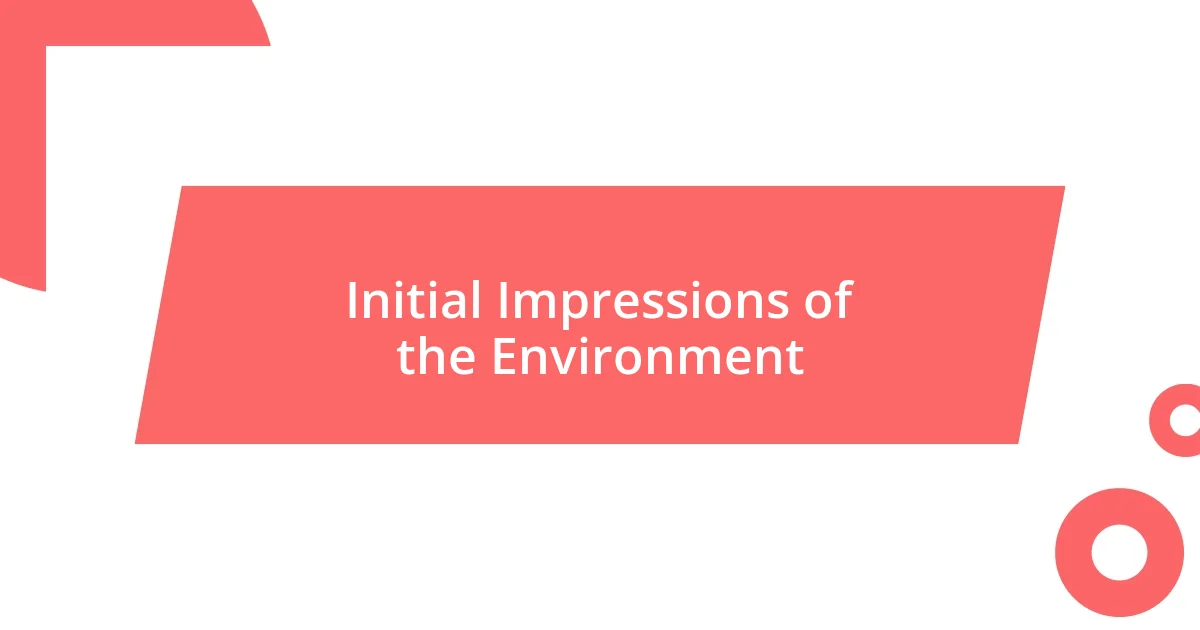
Initial Impressions of the Environment
As I wandered through Brazil, my initial impressions of the environment were nothing short of mesmerizing. The lush greenery, especially in places like the Atlantic Forest, felt alive. I distinctly remember hiking a narrow trail when a waterfall suddenly appeared, cascading down rocks that shimmered in the sunlight. The cool mist on my face was invigorating, reminding me how nature has its unique way of welcoming you in.
- The air was thicker than I’m used to, filled with moisture and the scent of earth after rain.
- Brilliantly colored birds flitted by as if performing for an audience of one.
- I felt a sense of peace each time I paused, absorbing the beauty surrounding me, realizing this was unlike any other destination I had ever visited.
There was a moment while exploring a small village near the Pantanal—a vast tropical wetland—when I connected deeply with my surroundings. The locals, living in harmony with this stunning ecosystem, emphasized sustainability and conservation practices over generations. Watching them interact with their environment made me reflect on my own lifestyle choices, bridging a personal gap between travel enjoyment and responsible tourism.
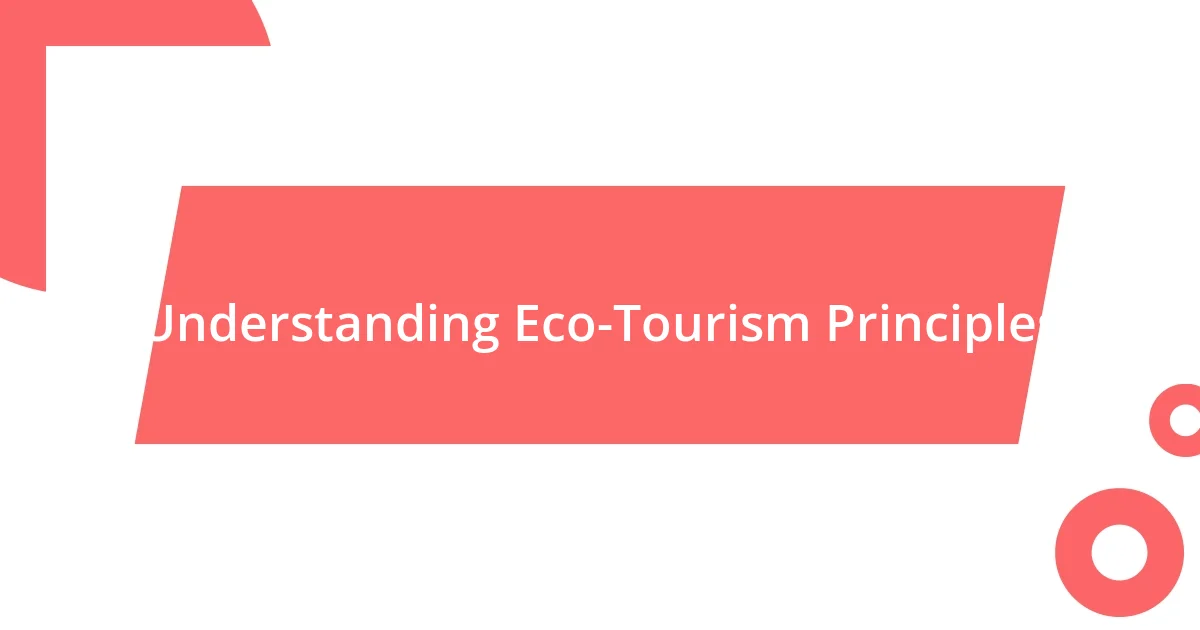
Understanding Eco-Tourism Principles
Understanding eco-tourism principles is about more than just exploring beautiful landscapes; it’s about embracing values that respect and protect the environment. I remember sitting on a small boat in the Pantanal, observing the delicate balance of nature. Suddenly, our guide pointed out a family of capybaras, peacefully cohabitating with caimans. This kind of coexistence really drove home the importance of respecting wildlife habitats. It made me think: how can we enjoy nature while ensuring it thrives for generations to come?
At its core, eco-tourism emphasizes sustainability, involving practices that minimize the ecological footprint. I recall visiting an eco-friendly lodge, where the owners practiced conservation through solar energy and waste reduction. It was fascinating to see how responsible tourism can lead to positive environmental impacts. When travelers support such initiatives, it reinforces the message that our choices matter. Have you ever looked at your travel habits and wondered how they contribute to sustainability?
In addition, eco-tourism fosters cultural exchange, enriching both travelers and local communities. I remember sharing a meal with a family in a remote village, learning about their traditions and values. They explained how their ancestors taught them to care for the land. This personal connection highlighted the symbiotic relationship we can form with local cultures when we choose to travel responsibly. It made me reflect on the deeper purpose of my adventures and the impact we can make by simply being mindful travelers.
| Eco-Tourism Principles | Description |
|---|---|
| Environmental Conservation | Focus on protecting natural resources and ecosystems |
| Sustainable Practices | Integrating eco-friendly solutions in tourism operations |
| Cultural Respect | Honoring local traditions and values through travel |

Discovering Eco-Friendly Destinations
When I set out to find eco-friendly destinations in Brazil, I was genuinely surprised by how vibrant and diverse they were. From serene nature reserves to community-run conservation projects, every spot seemed to echo the sentiment of preservation. I’ll never forget visiting an initiative in a quaint village where the locals transformed discarded materials into art, reminding us that even waste can have a purpose.
The thrill of discovering these places was heightened by the passionate people I met along the way. One encounter stands out: a young woman named Ana, who ran an eco-lodge surrounded by stunning landscapes. As she shared her experiences of restoring the land after clear-cutting, I felt an emotional tug at my heart. It prompted me to think—what legacy are we leaving for future generations when we travel? Every choice we make as tourists can either help or hinder these delicate ecosystems.
Even as I ventured off the beaten path, it became clear that responsible tourism isn’t just about the places we visit; it’s about the genuine connections we forge. I often reflect on how these encounters have transformed my perspective on travel. Have you ever felt that pull towards a destination because of its commitment to the environment? It’s these stories and shared values that resonate long after the trip is over, creating a lasting impact on both us and the communities we visit.

Engaging with Local Communities
Engaging with local communities during my eco-tourism adventures in Brazil has been nothing short of transformative. I vividly recall attending a festival in a small Amazonian village, where the rhythmic beats of traditional drums drew me in. The warmth of the locals was palpable as they welcomed us, eager to share their folklore and dance. It made me realize how much we can learn from these cultures, not just about their traditions, but also about their deep-rooted respect for nature.
One afternoon, I helped a local artisan weave colorful baskets from natural fibers. Each twist and turn of the material felt like a connection to the land and the community’s history. As we chatted, she shared how eco-tourism allows them to preserve their heritage while benefiting economically. I couldn’t help but wonder: how many travelers are aware that their presence can empower these communities? Engaging with local artisans not only supports their craft but also fosters a deeper appreciation for their way of life.
The relationships I built with these communities have profoundly changed how I approach travel. I often think back to the elders who recounted stories of their ancestors and their sustainable practices. It struck me how those narratives could be lost if not for responsible tourism. Have you ever considered that each conversation with a local can unveil layers of understanding that enrich your experience? By engaging with communities, we not only become part of their story but also contribute to an ongoing dialogue about preserving our planet and its diverse cultures.
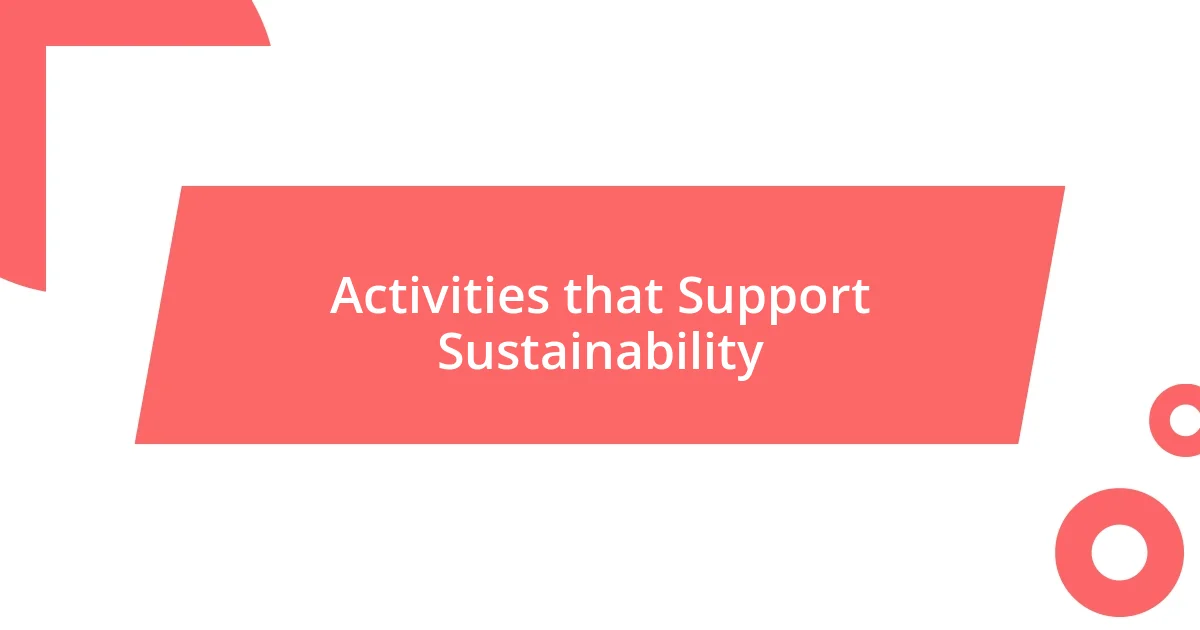
Activities that Support Sustainability
Participating in conservation activities is a significant way to support sustainability during eco-tours in Brazil. I remember volunteering with a group that was replanting native trees in an area devastated by deforestation. It was inspiring to see the locals and tourists alike working side by side, united by a common purpose. Have you ever felt the dirt under your nails while knowing that you’re literally planting seeds for the future? That day, I didn’t just plant trees; I deepened my connection to the land and its people.
Another memorable experience was joining a beach cleanup along the stunning coast of Bahia. As we collected plastic debris, I couldn’t shake the overwhelming feeling of responsibility. The waves crashing behind us were beautiful, but littered with reminders of our consumption habits. It made me question—how often do we reflect on the impact of our everyday choices? By participating in such activities, we not only help the environment but also raise awareness for others to follow suit.
One of the most enlightening moments came when I attended a workshop on sustainable farming practices in a quaint countryside community. Together, we learned how to grow organic crops while preserving the ecosystem. The sense of shared purpose forged bonds that transcended language barriers. I often think back to that day and realize how powerful it is to be part of a movement that champions the health of our planet. Have you ever participated in something that made you feel like you were part of a larger cause? Those moments are what truly define our travels and experiences.
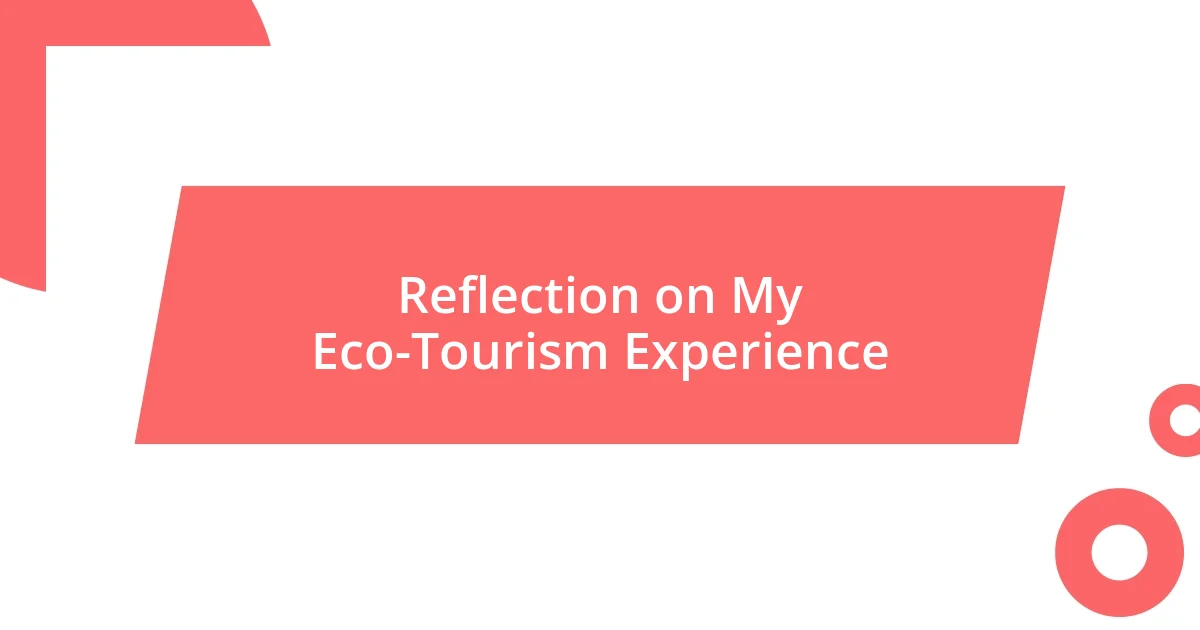
Reflection on My Eco-Tourism Experience
Reflecting on my eco-tourism experience, I find myself thinking about the little moments that profoundly shaped my perspective. One evening, while sitting around a campfire with fellow travelers and local guides, I listened intently to their stories. The air crackled with laughter and shared insights about the Amazon’s incredible biodiversity. I was struck by an overwhelming sense of interconnectedness—not just with the people, but with nature itself. Have you ever felt that deep connection, like you were a thread woven into a larger tapestry?
I also recall an instance when a local elder invited me to join him on a nature walk. As we wandered through the lush greenery, he pointed out the various medicinal plants that have nourished his community for generations. My heart swelled when he gifted me a small sachet of dried herbs, reminding me that with every step into nature, we step into a living history. Isn’t it fascinating how simple acts can forge such meaningful connections?
These reflections continually urge me to revisit my choices as a traveler. I often wonder if we truly grasp the impact of our presence in these stunning ecosystems. On my journey, I learned that every small decision, from where we stay to what we consume, can significantly affect the environment and local communities. Do you consider the larger footprint you leave behind when exploring new places? I’ve come to believe that eco-tourism isn’t just about visiting nature; it’s about nurturing and preserving it for future generations.




